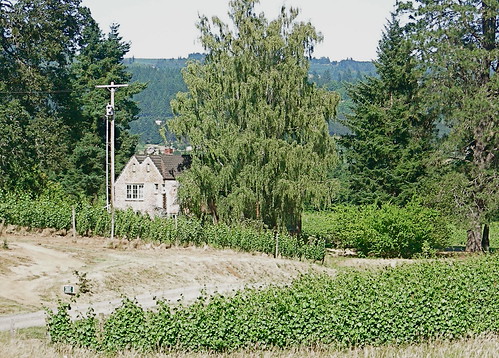
Brick House Vineyards
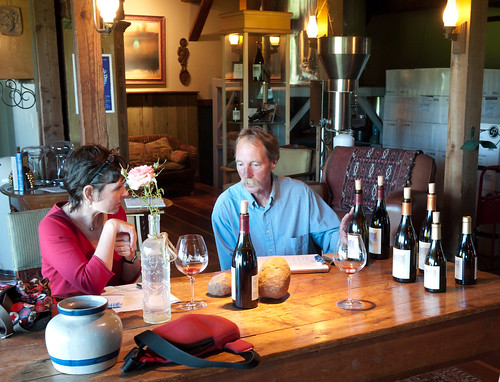
Tasting with Alan Foster
We started with the Chardonnay, made from estate grown fruits. The wine is certified organic, fermented with native yeast, aged in used oak barrels, and bottled without filtration. I particularly liked the 2008 Brick House Estate Chardonnay with its nose of pear and stone fruit, smooth and creamy mouthfeel, and mineral finish.
Then we moved to the 2008 Brick House Boulder Block Pinot Noir. The fruit comes from a volcanic hillside that greatly differs from the nearby sedimentary soils that characterize the Ribbon Ridge appellation. Columbia river basalt rocks can be found between vines throughout the parcel. These volcanic boulders are particularly good at retaining moisture and warmth during the growing season and it is usually the last block to be harvested. The cuvée is all Pommard clones — originally from cuttings imported in the 1940's from Château de Pommard — and sees more new oak than the other reserve Cuvées. The wine had a fragrant, spicy nose, a rich, fruity palate almost liqueurish, leaving a lasting earthy finish.

Basalt rocks from the Boulder Block parcel and the 2008 Brick House Boulder Block Pinot Noir
The next wine was the 2008 Brick House Evelyn's Pinot Noir. For me, it had an even stronger spicy character and a longer finish. The cuvée is named after the mother of winemaker and founder Doug Tunnell. It is a blend from selected barrels and a very limited bottling built for long-term aging.
My husband had heard that the winery was making some gamay and asked about it. The current vintage had been sold out for a while but Alan let us taste a barrel sample of the 2010 vintage. There was no banana, candy, or bubble gum quality in the wine. Instead, it had some good depth and structure with some of these aromas of tobacco and black fruit that could also found in some of the best Crus of Beaujolais.
We were also lucky when we arrived at Eyrie Vineyards' historic winery in downtown Mcminnville. The previous visitors were still in the barrel room when we arrived and we were able to continue the guided visit of the wine facility.
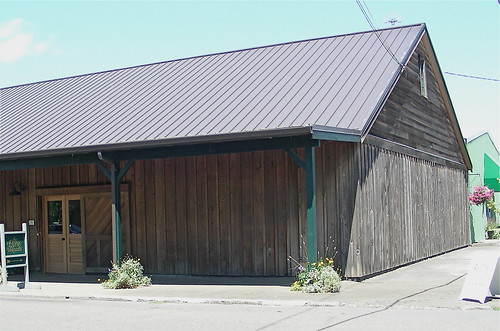
The Eyrie Vineyards
The history of Eyrie is now well known but still fascinating. In 1965, David Lett — locally known as Papa Pinot — came to Oregon from California with 3,000 vine cuttings and planted the first Pinot noir vines in the Willamette Valley. One year later, he founded The Eyrie Vineyards with his wife Diana and produced his first vintage of Eyrie Pinot Noir in 1970. Then in 1979, the winery suddendly caught the attention of the international wine community as the 1975 Eyrie Vineyards Reserve Pinot Noir successfully competed at the Wine Olympics held in Paris that year. This instantly put Oregon on the map as a world class Pinot noir producing region.
Lett's original plan was to build a winery on the hillside overlooking the estate vineyard in the Dundee Hills but he found no bank to loan him any money. So he ended up refurbishing an old poultry plant in McMinnville. Many years later, his son Jason Lett is still making wine in the original building with even a few barrels from the 1970 vintage still in use. The mold that grows on the walls is part of the cellar's natural environment and is thought to play a positive role during the winemaking process.
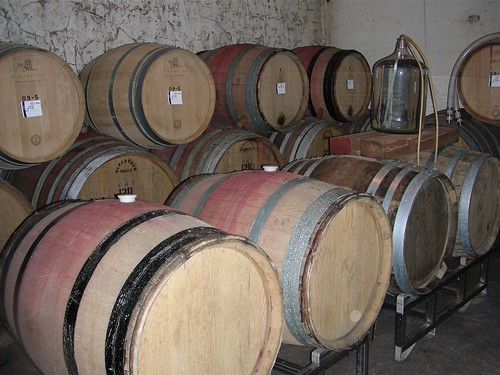
The barrel room and the mold on the walls
Here are some of the wines we tasted:
2007 The Eyrie Vineyards Estate Pinot Noir: from the four estate vineyards in the Dundee Hills. The youngest vines were planted 19 years ago. Aged in mostly neutral French oak. Fresh nose of griotte cherry, tasty, well balanced, lively finish.
2008 The Eyrie Vineyards BlackCap Pinot Noir: made with organic fruits from the Dundee Hills and Carlton-Yamhill appellations. The vines are 20-year old and own-rooted (non grafted). Dark color, more earth and spices than fruit, concentrated.
2006 The Eyrie Vineyards Pinot Noir Reserve Original Vines: from Eyrie's original planting, 40-year-old vines grown on their own roots. Aged nearly two years in used barrel, bottled without filtration or fining. Sweet nose of wild berry, creme de cassis and spices, great texture, absolutely delicious!
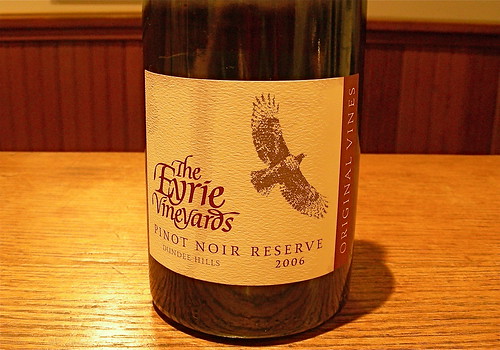
2006 Eyrie Pinot Noir Reserve Original Vines
Technorati tags: wine food & drink
No comments:
Post a Comment